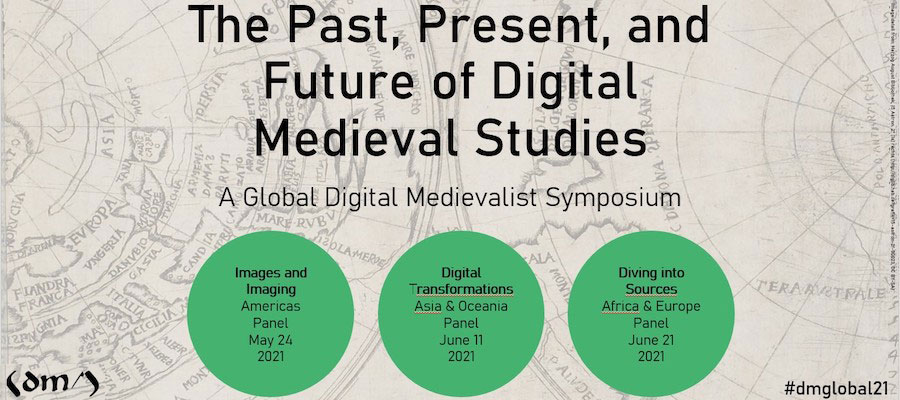The Past, Present, and Future of Digital Medieval Studies – A Global Digital Medievalist Symposium, Zoom, May 24, 2021 (11:00 am–3:30 pm EDT), June, 11, 2021 (10:30 pm–4:30 am EDT), June 21, 2021 (7:00–11:30 am EDT)
The era of COVID-19 has been transformational for medieval digital humanities. Medievalists have come to learn the limits and possibilities of online scholarship, whether in the virtual classroom or in the transfer of knowledge among specialists. Although direct access to material sources and the easy face-to-face exchanges with colleagues are deeply missed, we have come to understand that digitally-inflected scholarship can be more economical, more global, and –in limited ways– more equitable for many medievalists. And because we have come to this inflection point, members of the Digital Medievalist Board are launching a conference series that marks this turn and aims to build upon what we have learned. Our theme, The Past, Present and Future of Medieval Digital Studies is both retrospective and prospective in scope, bringing digital medievalist practitioners into conversation with each other as we step into a new scholarly environment where digital methods take on a new importance.
Our new global awareness has inspired us to plan three conference dates, each of which is aligned with a geographic space and accommodates scholars from three time zones grouped as The Americas, Asia & Oceania, and Europe & Africa. The Americas conversation will take place on Monday, 24 May 2021, Asia & Oceania on Friday, June 11, and Europe & Africa on Monday, June 21.
Africa & Europe: Diving Into Sources – Monday, June 21, 2021, 7:00–11:30 am EDT
For medievalists worldwide, digital media has fundamentally changed the way how we access our sources and work with them: digital editing, digital imaging, databases, text mining and visualisation are but some keywords that have gained relevance over the last decades and have influenced and inspired new research directions in the field. Other methodologies, such as Linked Open Data and Machine Learning, are emerging as key approaches for current and future research, driven by the huge amount of digital research data that is being produced by hundreds of medieval research projects every year.
This conference is dedicated to reflecting on the past, present and future of medieval studies and its transformation thanks to these methodologies. When we think about the future, we should also be conscious of areas in medieval studies that have been underexplored and underappreciated by the field at large. Using a visionary perspective, the first panel will discuss developments in how medieval source data are represented, analysed and interpreted. The second panel focuses on Linked Open Data and its application to medieval studies. The final panel brings together scholars working with textual and material data from various manuscript traditions and cultures to discuss how DH methodologies impact on their research.
Organized by Roman Bleier, Hannah Busch, Els De Paermentier, Tessa Gengnagel, and Daniela Schulz.
Co-sponsored by the Centre for Information Modelling at the University of Graz.
Advance registration required.
